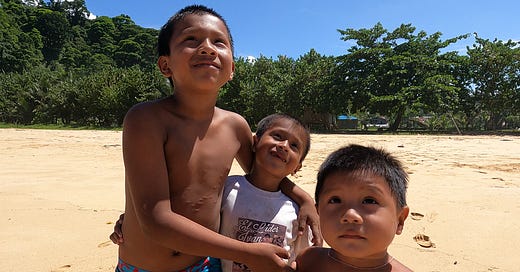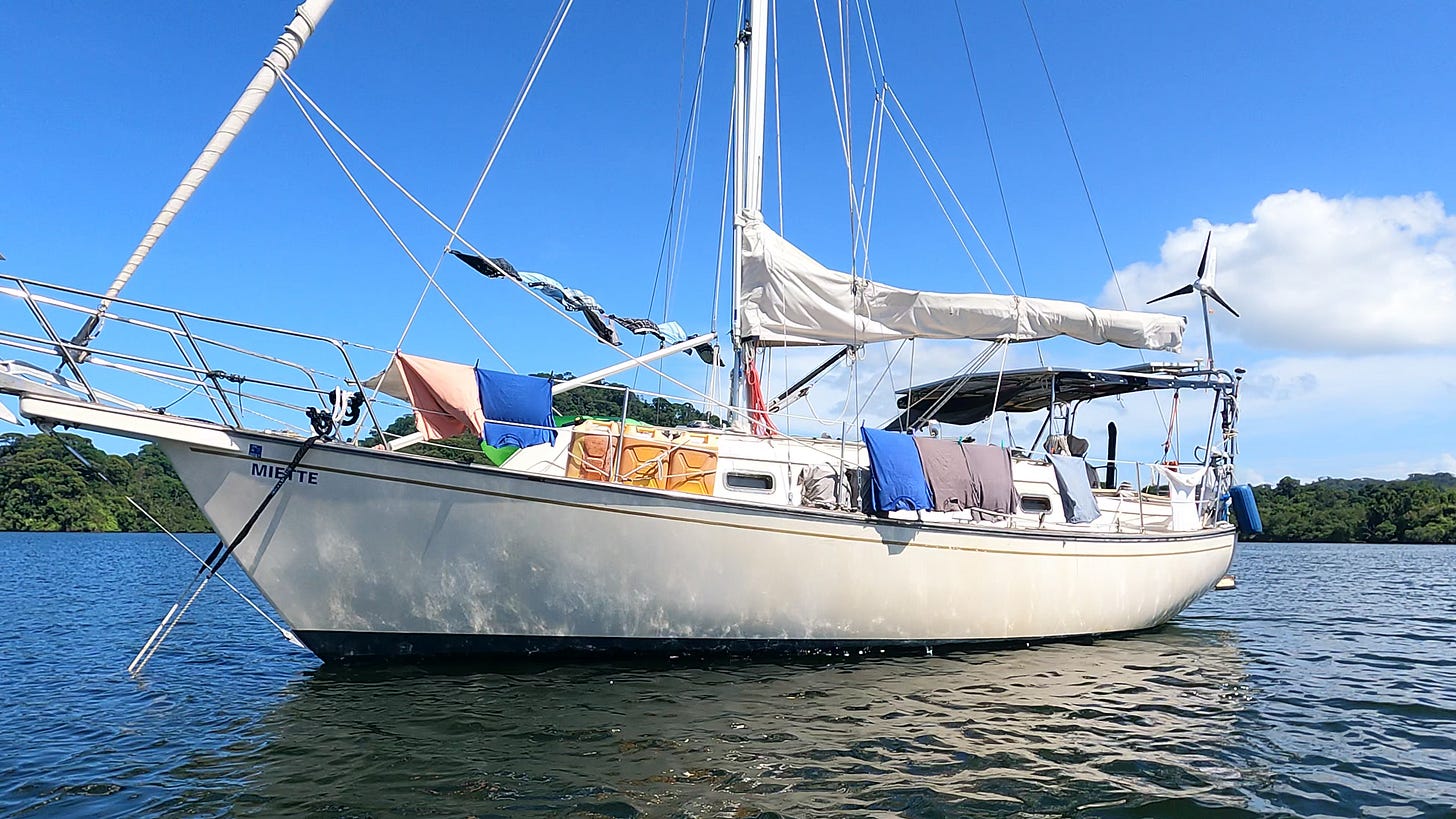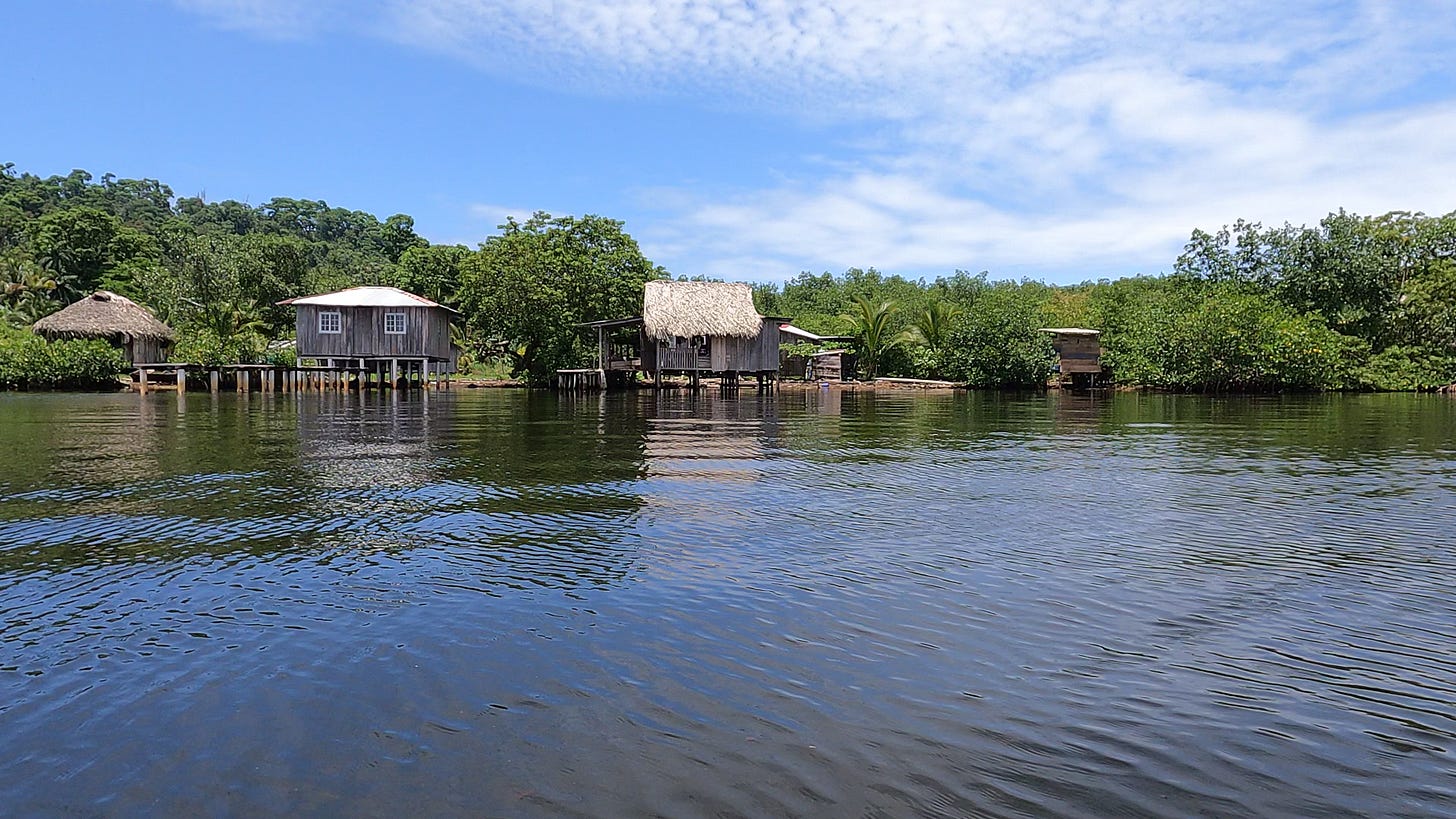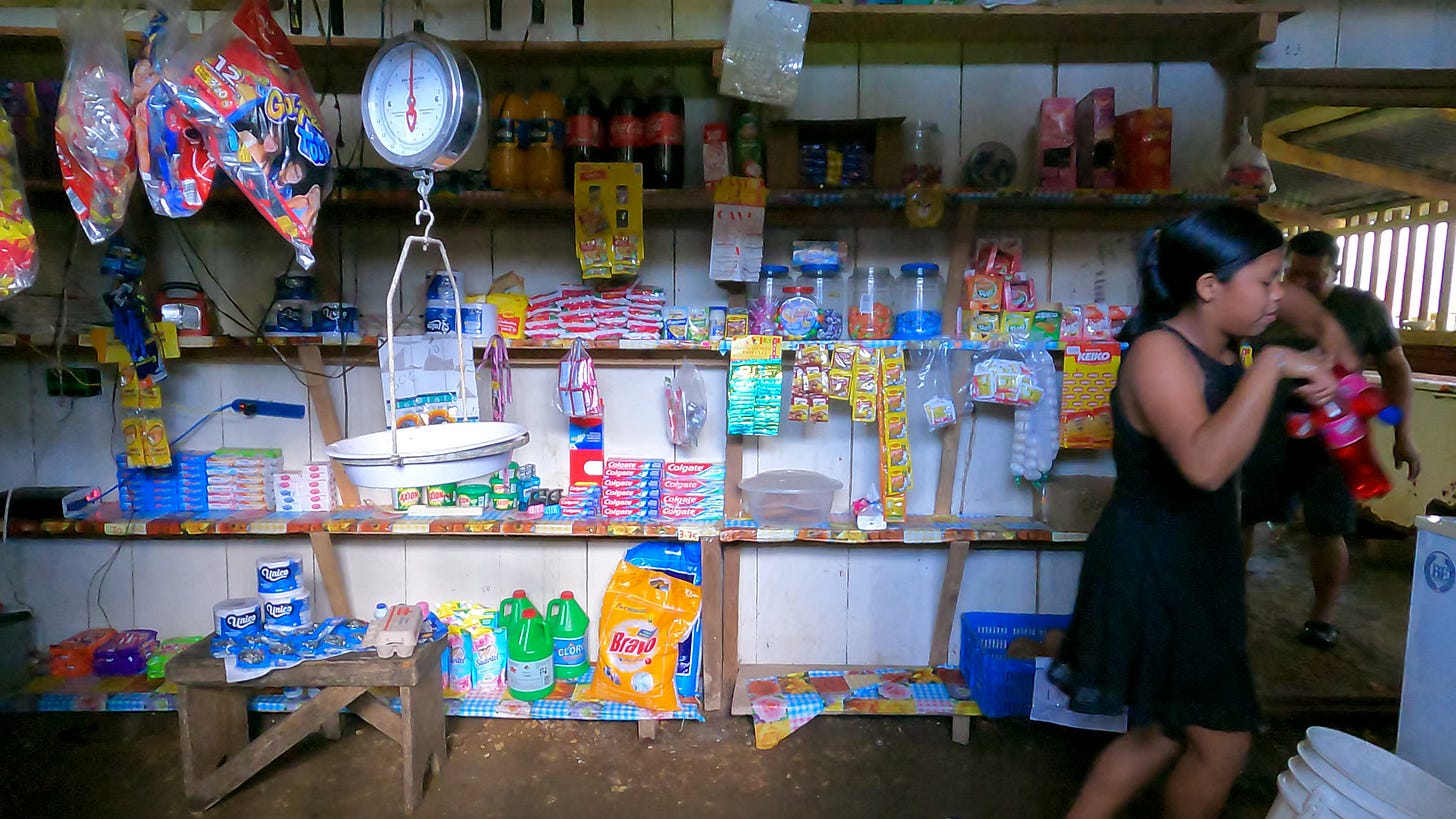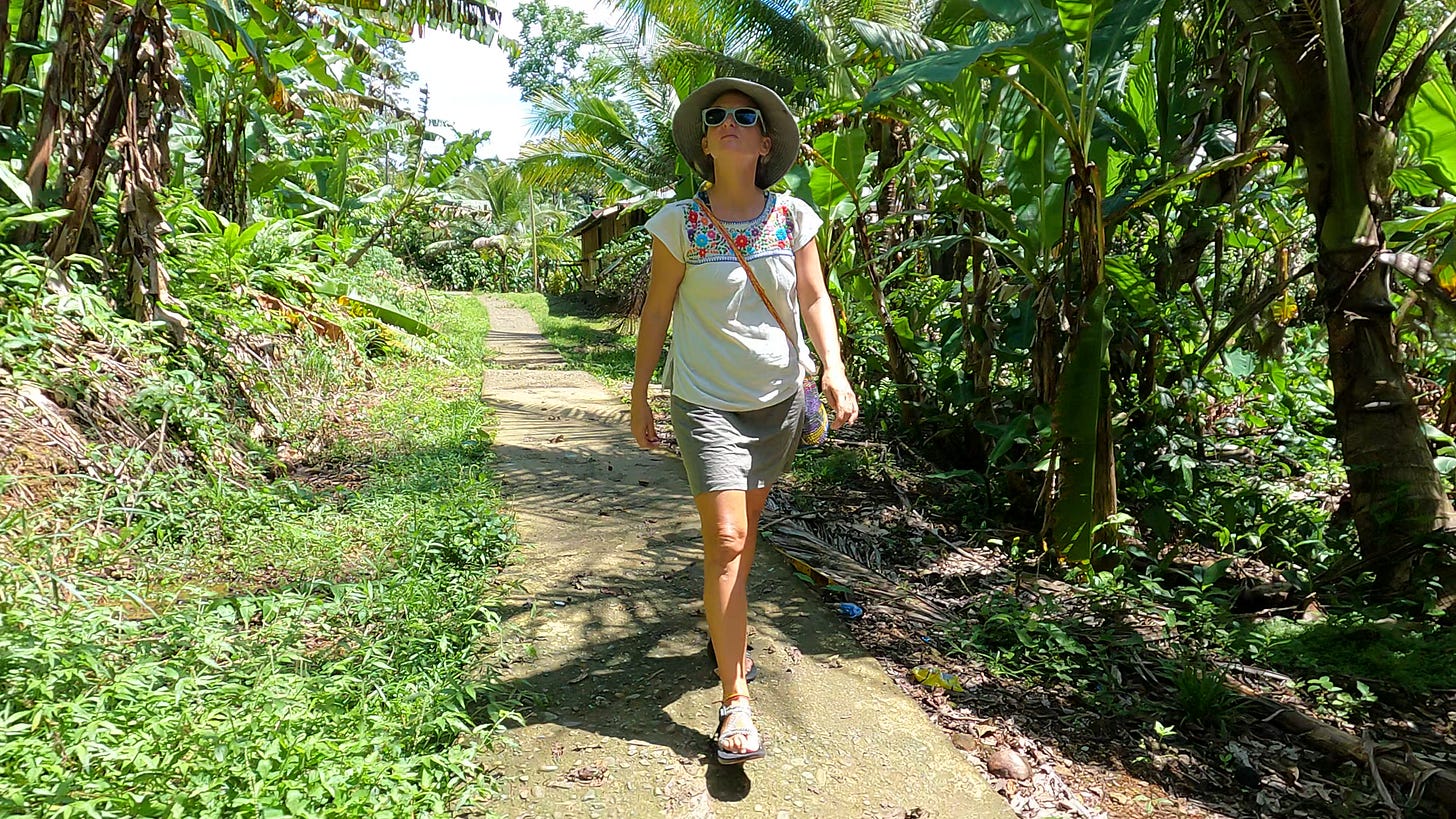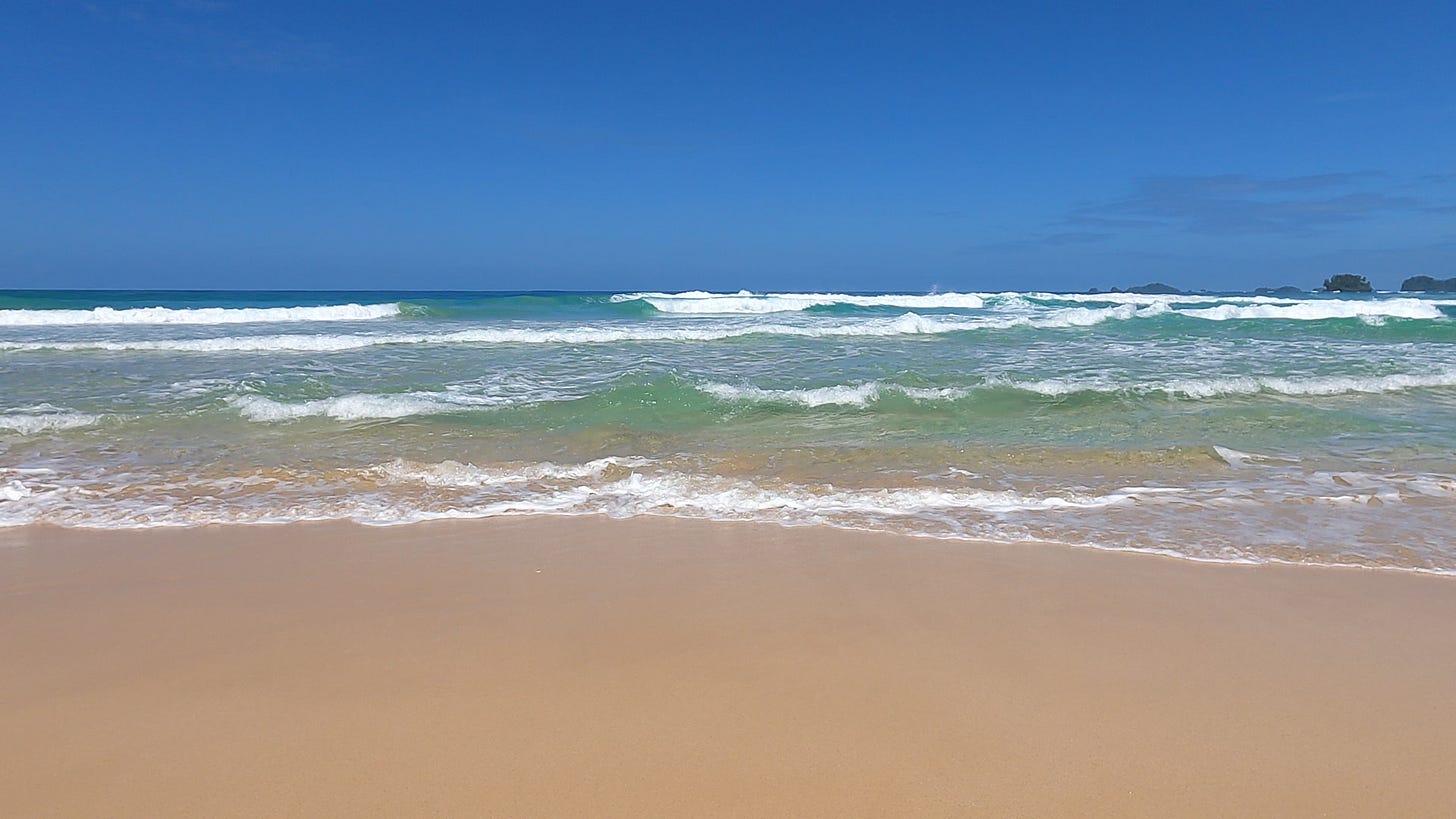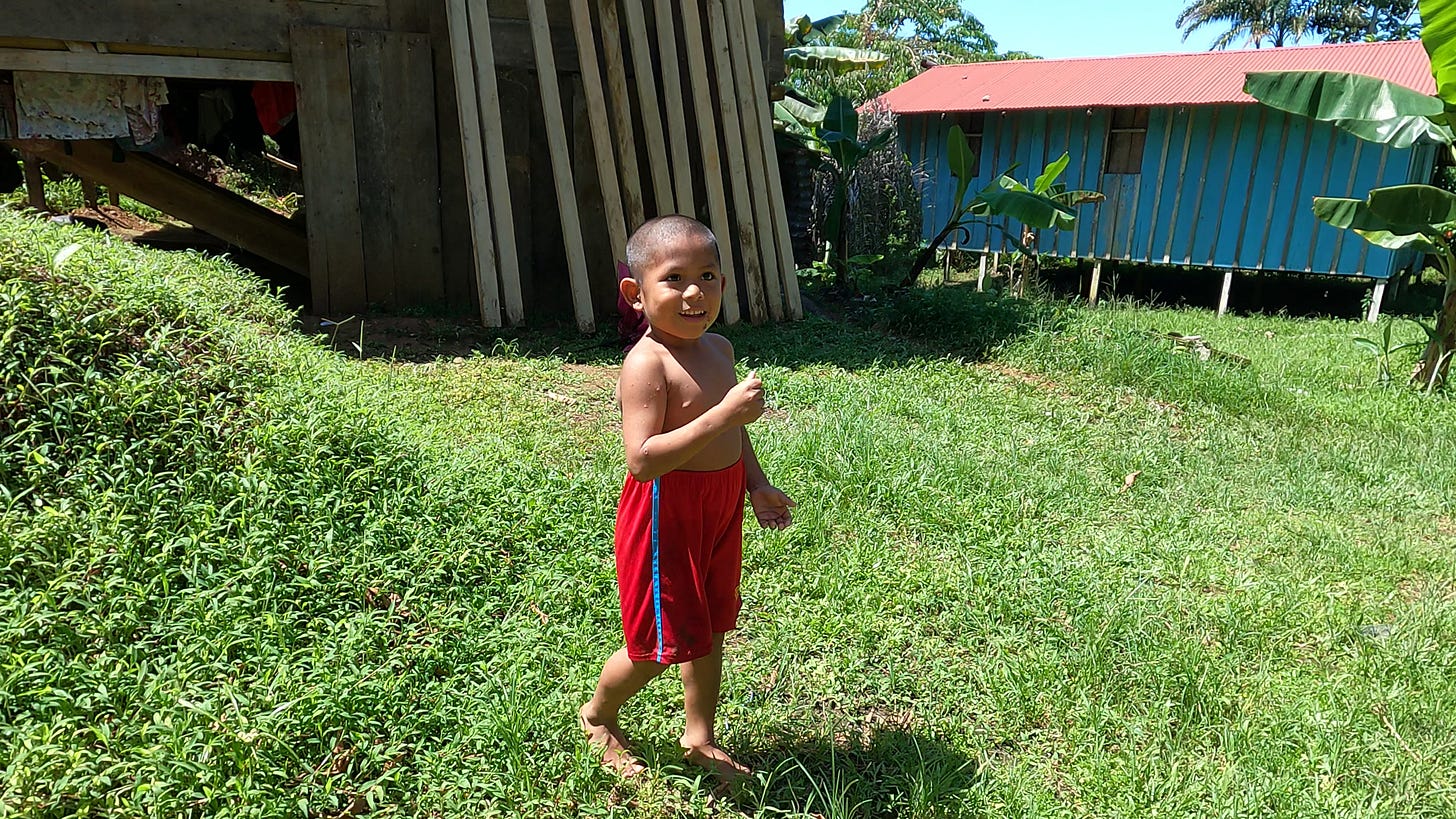Going Ashore at a Ngäbe Village
Sunshine finally prevailed after days of rain. We lowered Rusty, our plastic dinghy, into the green water and attached the outboard engine.
While I spent the morning with my face buried in a laptop earning money, Shawn had spent the morning doing laundry. That involves stomping clothes in a large bucket through a soapy bucket, then successive stomps through buckets of fresh water. She has a hand-wringer, and one by one, cranks the clothes through two cylinders, squeezing the water out. Next, Miette’s lifelines display our colorful array of clothes. Even in the humidity, the tropical sun doesn’t take long to dry them out.
Once we both came to a stopping point, we climbed aboard Rusty with the goal of just going for a little cruise, scoping out the shoreline of the village of La Ensenada.
Children must have been getting out of school. They packed themselves into the dugout canoes (each made from a single tree trunk), with the oldest child usually paddling. Some even had button-up shirts. Most of them stared, but some waved at us.
As we slowly passed houses on the shore, an old man waved at us from a chair, raising both his arms. The gesture seemed to welcome us to approach.
He and a few women were sitting in the shade of their patio which hung over the water. Next to the patio was a lancha, an open air motor boat (also called pangas in other parts of Latin America, and skiffs in English).
I started the conversation with “hola”. Hello.
He said something unintelligible. Continuing in Spanish, I asked if he spoke Spanish.
“Ngäbere,” he replied. That’s the indigenous language here, of which I know nothing.
He said a something else, and there was definitely a Spanish word mixed in. I tried again, “do you know a little Spanish?”
Again he said something in Ngäbere and chuckled, as did the woman now standing next to him, looking at us.
“I’m sorry, I don’t understand your language.”
The woman intercedes. “He’s just playing around. He speaks Spanish just fine.”
The man switches to Spanish. “Brother, how could I not speak Spanish living in a comarca of Panama?” and laughs (comarcas are the regions of Panama, something like a US state).
He introduces himself as Jesse Samuel, and tells us that, thanks to God, he’s lived here his whole live. He owns the lancha tied to the porch, and operates a water-taxi to Chiriqui Grande, a little mainland town about an hour and a half away.
We tell him we’ve heard from locals that have paddles canoes out to us that there is a walkway to the beach, on the Caribbean side of the peninsula. He says there are two. There is a fork in the path, but they both take you to beautiful beaches. If you take the left, you’ll get approached by locals to pay a fee to use the beach, so he recommended going to the right. “They’re all my people, of course, but I don’t like how they hassle visitors. Visitors should be welcomed. The beach is very beautiful, and you can find food and drink there, even a place to stay if you want to spend a night or two.”
He asks when we leave and we tell him the next sunny day. The woman next to him interrupts me, and looks at Shawn. “Come visit me again before you leave,” she says. “Oh, ok!” replies Shawn.
We ask about fruits and vegetables, since we’re down to one lime and a little bit of soft coconut. He tells us we can find various types of bananas, the ones with the round sides, the ones with the squared sides, and wild ones. One of the women bring out a small bunch and offer to sell them to us. We hadn’t brought any money, so we motor to Miette, grab a little money and sandals, and return.
As we’re wrapping up the conversation, the woman once again interrupts, again looking at Shawn, and again repeats her previous demand: before you leave, come visit me again. She’s smiling, so makes it a little less weird. Shawn laughs it off.
He tells us there is a store just up from the village dock, so that’s our next stop. It’s one of those stores you can’t actually enter. Instead, you stand at a small window, peer inside, and ask for what you want, like we found in Nicaragua.
The store keeper tells me his name is Oscar Baker, and tries out a few English phrases on us, but we end up sticking to Spanish. His daughter is stocking a refrigerator, which surprises me.
“You have cold things!” I exclaim.
“Yes, we have this, we have this, and this,” he says, holding up bottles of soda.
Shawn inquires about ice cream, but strikes out.
I ask about fruits and vegetables. I don’t see any, but there’s a scale hanging in front of me, and I assume that’s what it’s for. He says he has a couple onions, a few poblano peppers, and a couple stalks of celery. I politely decline, pay for a cold beer, and we continue walking on a concrete path. Concrete! I imagine the back-breaking labor it must have taken to carry all those bags of concrete mix, aggregate, and buckets of water through the jungle.
Walking up over the crest and through the jungle, all along a concrete path, we pass small patches of cultivated banana trees.
The small wooden huts are all up on stilts. The air is full of the sound of chickens, children playing, mothers calling out to them - and sounds of chainsaws. The lumber for their houses and canoes comes from the jungle surrounding them.
Walking quietly, we try not to draw attention because it feels like we’re passing through the back yards of all of these people. There are no fences, just distance and jungle that provide privacy between the huts. Because it’s a sunny day, they also have laundry hanging on lines, just as we do (and I imagine they washed them the same way, as well).
Every now and then, a child sees us, staring mouth open. Where there was one face, when we look again, there are three or four, all staring blankly at us. Shawn waves and smiles, and they wave back, then run off.
The sound of big waves crashing begins to get louder, and the thick green jungle parts open to reveal incredible blues and bleached white sands. The concrete path ends, and we traipse through some mud. While a group of teens stare at us, the mud sucks the sandal off my foot. Oops.
We walk out onto the sand and into the beautiful water.
We must have missed the turn to the right. No sooner than we get our feet wet does a man come out to us. Four small children run along beside him. He fist-bumps me, then hands me a laminated card. Spanish on one side, English on the other, saying that we need to pay $5 for using the beach.
“But friend, we just came to look.”
“That’s OK. Pay the $5 dollars. There is food and drinks over there, you can spend the night over there.”
I cave. I give him $5. “You need to pay for her, too.”
“Look, brother. We came to look. I came with $10. I bought a drink and some bananas in Ensenada. This $5 is all I have left.”
He’s satisfied with that. “Ok, no problem. Some people refuse to pay at all. No problem. Enjoy the beach, and find me over there if you need anything at all.”
He smiles, we fist-bump again, and he walks back into the shade. The children linger around, looking at a mesh bag Shawn brought in case we found vegetables, then at her silicone wedding ring.
I ask them their names, which are odd. The little girl says her name is Mamita. Mommy. I ask, “really? your name is Mamita?” She nods. They each tell me their odd names, but I don’t understand the short, chubby kid.
I say to the others, “this little guy is so serious. He looks angry!” The other kids crack up laughing.
Living on the sea, even a pretty beach doesn’t hold our interest for long. The sun is cooking us, so we head back to the trail, where the jungle shade provides a bit of relief.
A little boy of about 3 or 4 runs up behind Shawn, startling her. He’s a little dirty and has scabs on his face.
“Tienes plata?” he asks. Plata is silver, but slang for money. Shawn’s about to say no, but I ask her to go ahead and give the boy a quarter. She fishes out a quarter and hands it to him as he slowly backs up. He holds it carefully, staring at it for a long, serious second, then looking back at Shawn, his face lights up with a smile.
A moment later, he bolts off back to his hut, disappearing.
We come across a group of kids, not quite teenagers. A blind man with a bamboo staff is being escorted by one of them, and another has a goat on a leash.
I want to ask if the goat is aggressive, but I get mixed up on the word for goat. At first, I say cabrón but immediately remember that’s slang for asshole or bastard. Cabra? try again. I’m fairly sure that’s right, but the boy stares at me blankly.
The blind man, sitting on the sidewalk facing away from us, says, chivo. Ah, yes.
Armed with the right word, I ask if the goat is his pet. He nods at the blind man, and says it’s his. The boy tells me the goat is named Pitbull.
In two days, we’ve met a girl with a cat named Butterfly, a dog named Tail (or Ass), a girl named Mommy, and a goat named Pitbull. Well, I have a friend called Gritty, and I suppose that’s a weird name, and right now he’d nod and say, “Cool. Cool. Right on.”
The next morning, Shawn gets her paddleboard down and visits the woman that insisted she return. They spend a couple hours chatting, Shawn’s brain getting a Spanish workout.
It is a beautiful, sunny day. I log off work early and talk to a local who paddled out to meet us. He didn't have anything to sell or trade, but mentioned needing clothes. I have a couple soccer shirts I bought in El Salvador that I don't wear and give them to him.
Once Shawn is back, has had lunch and stowed her paddleboard, the motor is started, anchor aweigh, and away we go.
